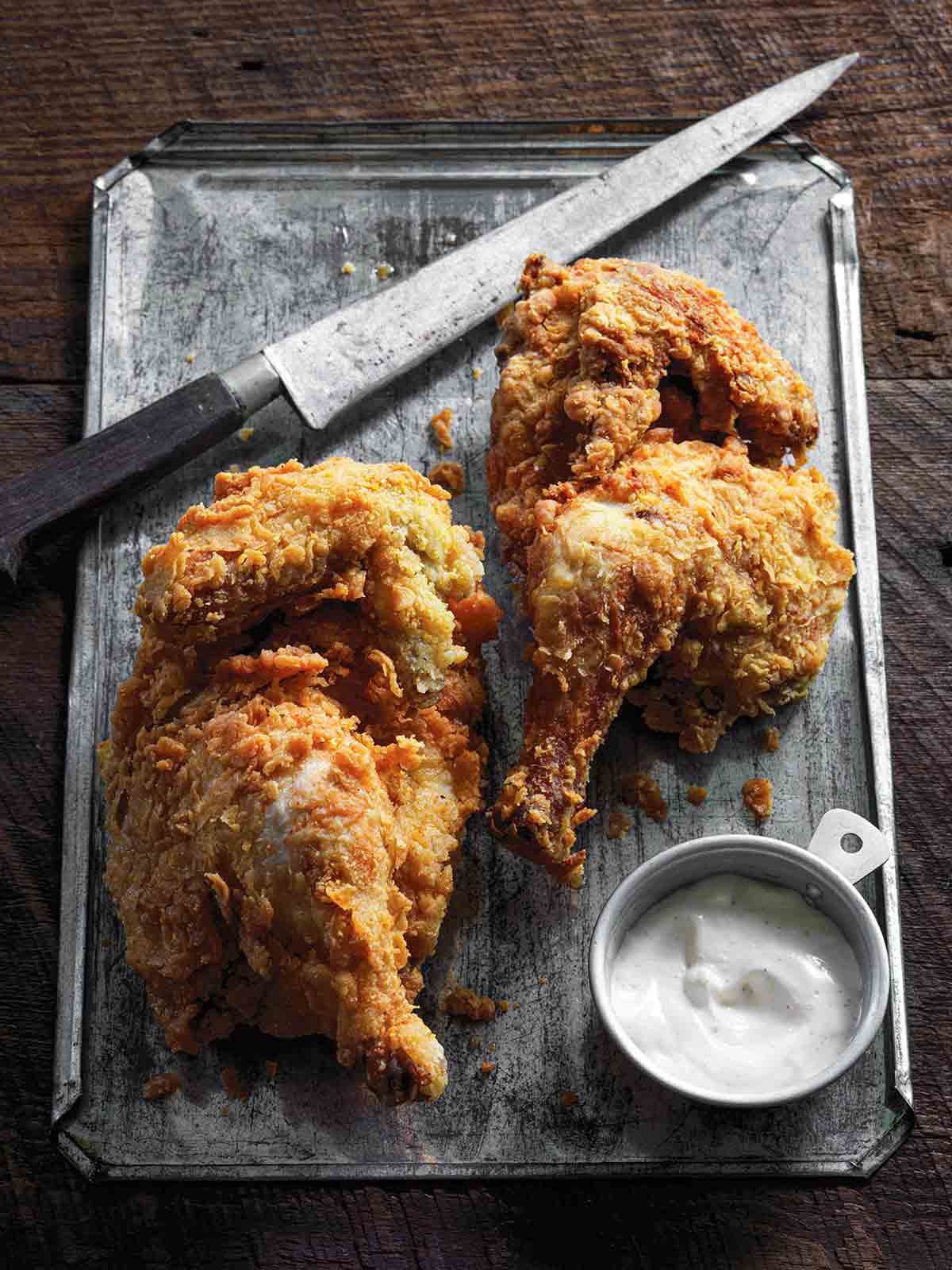
While living in Birmingham, Alabama, I had my first and eye-opening taste of cornmeal-crusted fried chicken with white barbecue sauce. To see a barbecue sauce that’s on the opposite end of the color spectrum from the typical red varieties is intriguing. Its tart, peppery creaminess is simply wonderful. Common throughout North Alabama, the tangy pale sauce is at its best on chicken, whether fried or grilled.–Rebecca Lang

Cornmeal-Crusted Fried Chicken with White Barbecue Sauce
Equipment
- Deep-fry or candy or instant-read thermometer
Ingredients
For the white barbecue sauce
- 2 cups mayonnaise
- 3/4 cup cider vinegar
- 1 1/2 tablespoons freshly ground black pepper
- 1 tablespoon firmly packed light brown sugar
- 2 tablespoons fresh lemon juice (from 1 lemon)
- 1/2 teaspoon cayenne pepper
For the cornmeal-crusted fried chicken
- One (4-pound) whole bone-in, skin-on chicken, backbone removed, cut into 8 pieces*
- 4 cups all-purpose flour
- 2 teaspoons sea salt
- 1 teaspoon freshly ground black pepper
- 1 cup whole milk
- 2 large eggs
- 1 cup finely ground yellow cornmeal
- Canola oil, grapeseed oil, or another mild refined vegetable oil, for frying
Instructions
Make the white barbecue sauce
- In a bowl, whisk together the mayonnaise, vinegar, pepper, brown sugar, lemon juice, and cayenne pepper. Pour 1 1/2 cups sauce into a large resealable plastic bag. Cover and refrigerate the remaining sauce for serving.
Marinate the chicken in the white barbecue sauce
- Place the chicken pieces in the bag with the remaining white barbecue sauce. Seal the bag, massage the chicken with your hands through the plastic to squish the sauce so it completely coats the chicken, and refrigerate for 24 hours.
Set up for skillet for frying
- When you’re ready to make fried chicken, in a 9-by-13-inch baking dish, whisk together 2 cups flour, 1 teaspoon salt, and 1/2 teaspoon pepper. In a large bowl, whisk together the milk and eggs. Grab a second 9-by-13-inch baking dish, dump in the cornmeal and the remaining 2 cups flour, 1 teaspoon salt, and 1/2 teaspoon pepper, and whisk to combine. Set these up in assembly-line fashion alongside your stove.
- Pour enough oil into a large, heavy, preferably cast-iron skillet to reach a depth of 1 1/4 inches. Place the skillet over medium heat until the oil registers 340°F (170°C) on a deep-fry or candy or instant-read thermometer
- Place a wire rack over a rimmed baking sheet and place it on the opposite side of the skillet. Heat the oven to 250°F (120°C).
Coat the chicken
- Working with 1 piece of chicken at a time, remove half the chicken from the marinade, returning the bag to the refrigerator. Dredge the chicken first in the flour mixture (the one without any cornmeal) and shake off any excess. Then dip the chicken in the egg mixture and wait while any excess goop drips off. Then dredge the chicken in the cornmeal mixture and shake off any excess. As you dip the chicken in each mixture, be careful to thoroughly coat all surfaces.
Fry the chicken
- Carefully place the dipped chicken in the hot oil, skin side down. Fry the chicken, turning it every 5 minutes and doing your best to keep the oil temperature hovering close to 300°F (150°C), until the chicken is cooked through and the juices run clear, 25 to 27 minutes.
- Using tongs, transfer the fried chicken to the wire rack to drain. Bring the oil in the skillet back to 340°F (170°C). Repeat the coating, frying, and draining steps with the remaining chicken, discarding the marinade.
- Pile the fried chicken on a platter or a baking sheet lined with waxed or parchment paper while steaming hot with the white barbecue sauce on the side.
Notes
Cornmeal-Crusted Fried Chicken With White Barbecue Sauce Variation
Cornmeal Crusted Fried Chicken Recipe For Two If you want to make a rather romantic supper of fried chicken for two, it’s simple. Just ask your butcher to cut the chicken in half rather than into pieces as fried chicken maven Rebecca Lang did for the photo above. It’s not only stunning, it’s savvy, seeing as this nicely guarantees you an ample portion of fried chicken—and equal parts white and dark meat. (You may wish to casually mention to your butcher that he can trim out the backbone, which he should really already know, but just use this as an excuse to ask him to wrap that up separately for you to toss in the freezer and pull out again next time you make chicken stock.)
Nutrition
Nutrition information is automatically calculated, so should only be used as an approximation.
Recipe Testers’ Reviews
This is one of the best fried chicken recipes I’ve ever had. The recipe takes a little advance planning since the chicken needs to marinate for 24 hours, which helped the chicken remain very moist despite a fairly lengthy frying time. The white barbecue sauce made a great dipping sauce for the fried chicken.
We fried the pieces until they reached a safe internal temperature of 165°F. The coating for the fried chicken was very flavorful, fairly light, and super crisp. The hands-on time was 10 minutes to make the marinade and about 30 minutes for frying.
This fried chicken recipe is spectacular. Using the white barbecue sauce as a marinade and a means of breading the chicken is perfect. The double dredge with basically 2 different coatings is a nice touch, as the chicken essentially has 4 layers. I really love this chicken on its own.
I chose to cut my chicken into pieces. A half fried chicken is a sight to behold, but individual pieces seem to have a lot more area for that nice, crisp breading to stick to, which is, of course, why we all love fried chicken! I used my candy thermometer to keep an eye on the oil temperature while it was heating and in between batches. I used my trusty 10 1/2-inch cast iron skillet. It took 2 1/2 batches to fry all the chicken, and I kept the finished chicken warm in the oven at 250°F. I will also mention that, when I initially read the recipe, I thought that the quantities of flour and cornmeal were excessive (5 cups). In hindsight, the measurements were quite accurate, and I’m glad that I didn’t scrimp.
Now, on to the white barbecue sauce. This is a very simple sauce and I found it to be extremely mild. At first, it seemed almost too mild, yet it had great flavor. I think using it as a marinade, a vehicle to coax the breading to adhere, and as a white barbecue sauce is nothing short of brilliant. One of the nice things about this sauce is exactly what bothered me at first taste. Its sheer simplicity lends itself to a multitude of flavors. I added horseradish to it, although you could go in nearly any direction with this fine basic sauce. This white barbecue sauce will be a staple in my arsenal. The possibilities are endless. My head is spinning!
What do I do with leftover fried chicken? Well, I make chicken salad. In this case, I chopped up my fried chicken, added another tablespoon of good old Duke’s mayo to the white barbecue sauce along with a bit of diced jalapeño, some diced Vidalia onion, and a touch of grated carrot.
I love this cornmeal-crusted fried chicken recipe, especially the white barbecue sauce. Some of my testers didn’t like the tangy taste of the chicken at all. But everyone loved the double coating of flour and cornmeal, which yielded a very crisp crust. It’s a really easy recipe; you just need to plan ahead because the chicken has to marinate overnight.
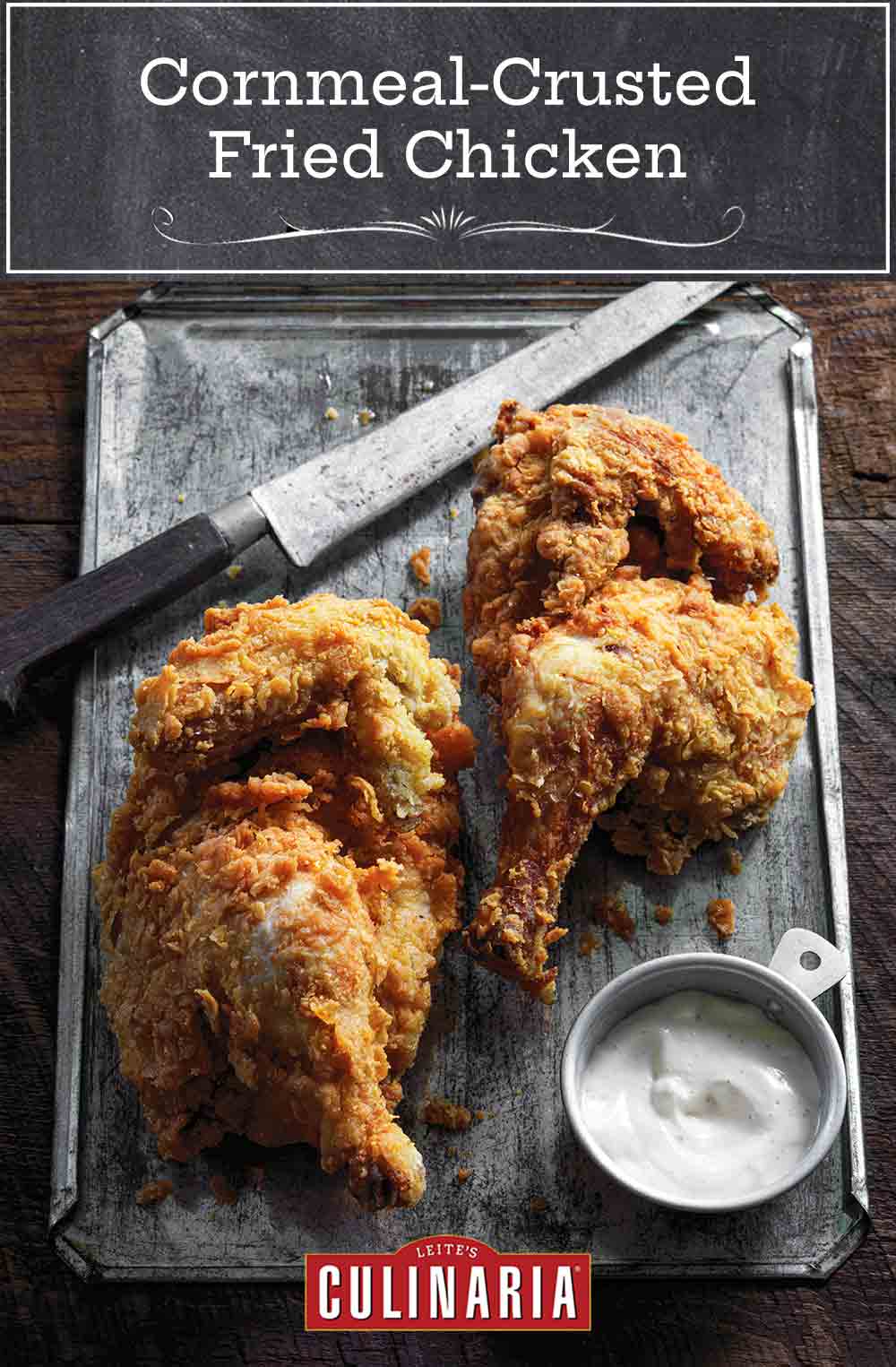



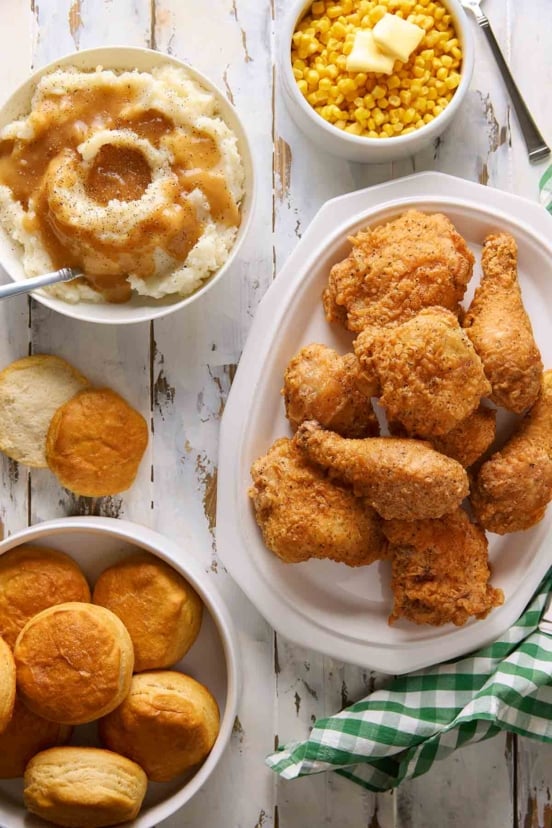
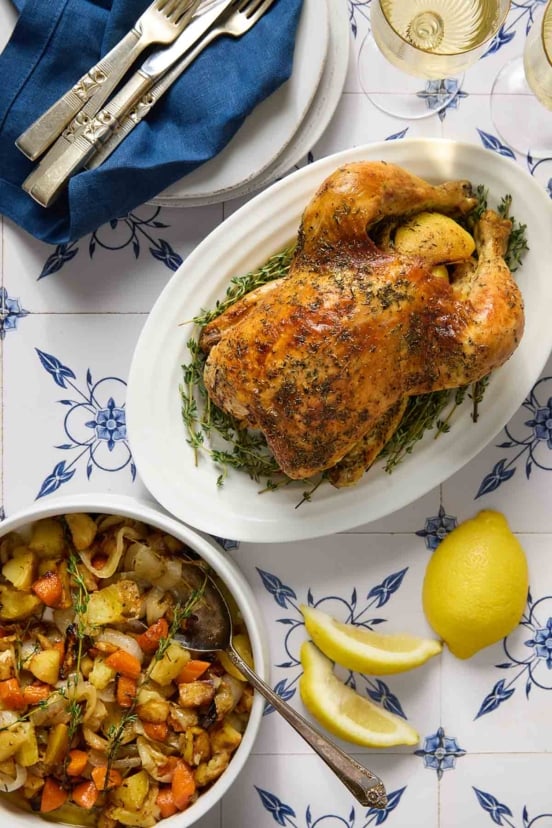
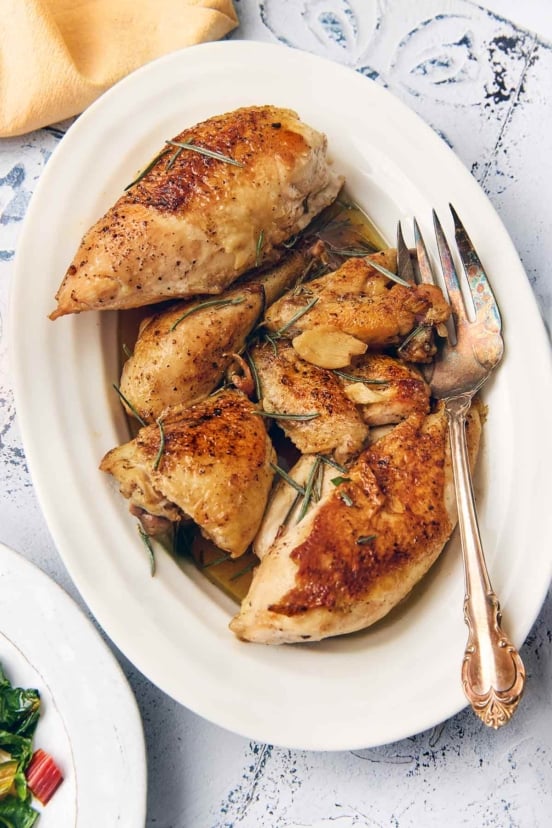









Oops, that was 10 times faster, I think that 30 or so minutes might do it, but who knows? Great gadget when you want to marinate at the last minute.
It sounds like a great gadget! I just didn’t want to hazard a guess as we’re not accustomed to using them. When all else fails, email the manufacturer!
I was satisfied with a 2-hour marinating time—plenty of time for the chicken to marinate and boy was it delicious. We here in Eastern Carolina are used to the sweet and tangy BBQ sauces. I have never had the white BBQ sauce!
Many thanks for checking back in, Rosemary, and I’m so glad to hear you liked the chicken and white barbecue sauce! Thanks, too, for reminding us that such a handy gadget exists. Looking forward to hearing which recipe on the site you try next!
I’m going to make this version as I am wading through Rebecca’s Fried Chicken book…I use the Food sealer marinating container as it drastically reduces the marinating and brining times, but I have no ideal how long to marinate in the white sauce, any ideas, anyone?
Rosemary, does the food sealer instruction manual offer any insight on how to calculate the revised marinating time based on the original marinating time?
I’m sifting through loads of opinions and recommendations for a definite answer and in part 3 times faster than a simple marinating process…crazy and different for different foods of course.